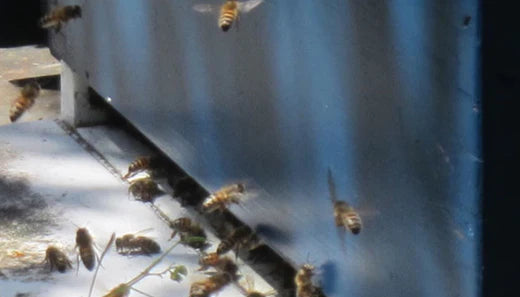Humans like to believe that we’re the most intelligent creatures on earth. Sure, we are clever, but we are also really good at destroying the world (and sometimes ourselves and other humans too). Nevertheless, we still think we are the center of the universe. Anthropocentrism is a thing. But there is so much we can learn from other life forms. Especially bees. So, here’s a list of what we can learn from these noble winged insects.

What we can learn from bees
1. Team work
You can only do so much alone and if there’s one species that knows how to efficiently work in a team, it’s the bees. There’s no rivalry going on, every single one of them has an assigned role within the bee hive. First there is the Queen, the only female bee with developed ovaries. Therefore, her job is to lay eggs and make sure the hive does not get over or underpopulated. The male bees are called ‘drones’ and are responsible for mating, whereas the female bees (worker bees) are the ones that pollinate flowers, keep the hive safe and take care of the queen. These workers are quite supportive to one another. If one bee is suffering or falling behind, the others step up and do the work, making sure that collective productivity is never reduced.
Question to ask yourself: do you operate as a teammember, or do you step on other peoples toes in order to get noticed?
Continue reading below...
2. Do good - we need each other
Bees need flowers, and flowers need bees. They have a mutualistic relationship where both species benefit from one another. Bees obtain nectar and pollen from the flowers to feed their colonies, and in the process of collecting these nutrients they automatically spread the pollen from flower to flower. This is called pollination, and without it plants cannot create seeds.
Question to ask yourself: what’s one thing that helped you, that also had a major positive impact on others?
Continue reading below...
3. Communication is key
Bees never break contact with the rest of the group. They are deeply engaged with one another and they continuously pass on the information they receive. Cool fact: did you know they communicate about the distance of food through a symbolic dance? The ‘Waggle’ dance was discovered by Karl von Frisch, it was already observed by Aristotle, but von Frisch research was one of the first to prove it was actually true. He was even awarded a Nobel prize!
Ask yourself: how often has a lack of communication been the problem of reaching a common goal?
We’d love it if you shared with us. Below you’ll find a comment section where you can drop your personal thoughts.





